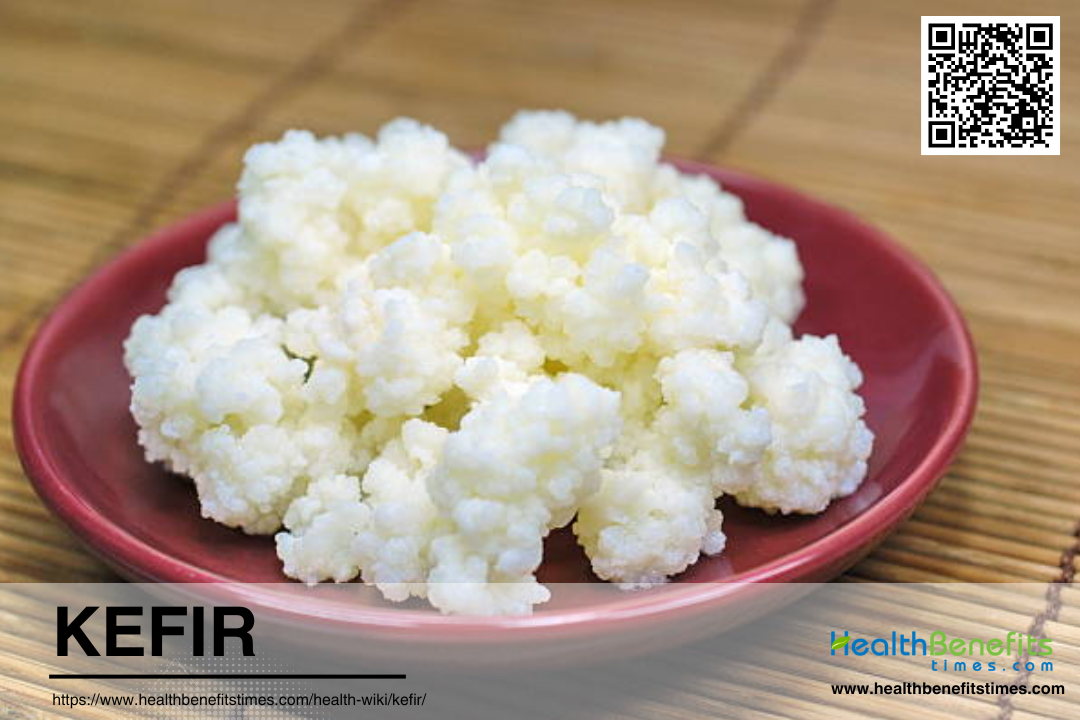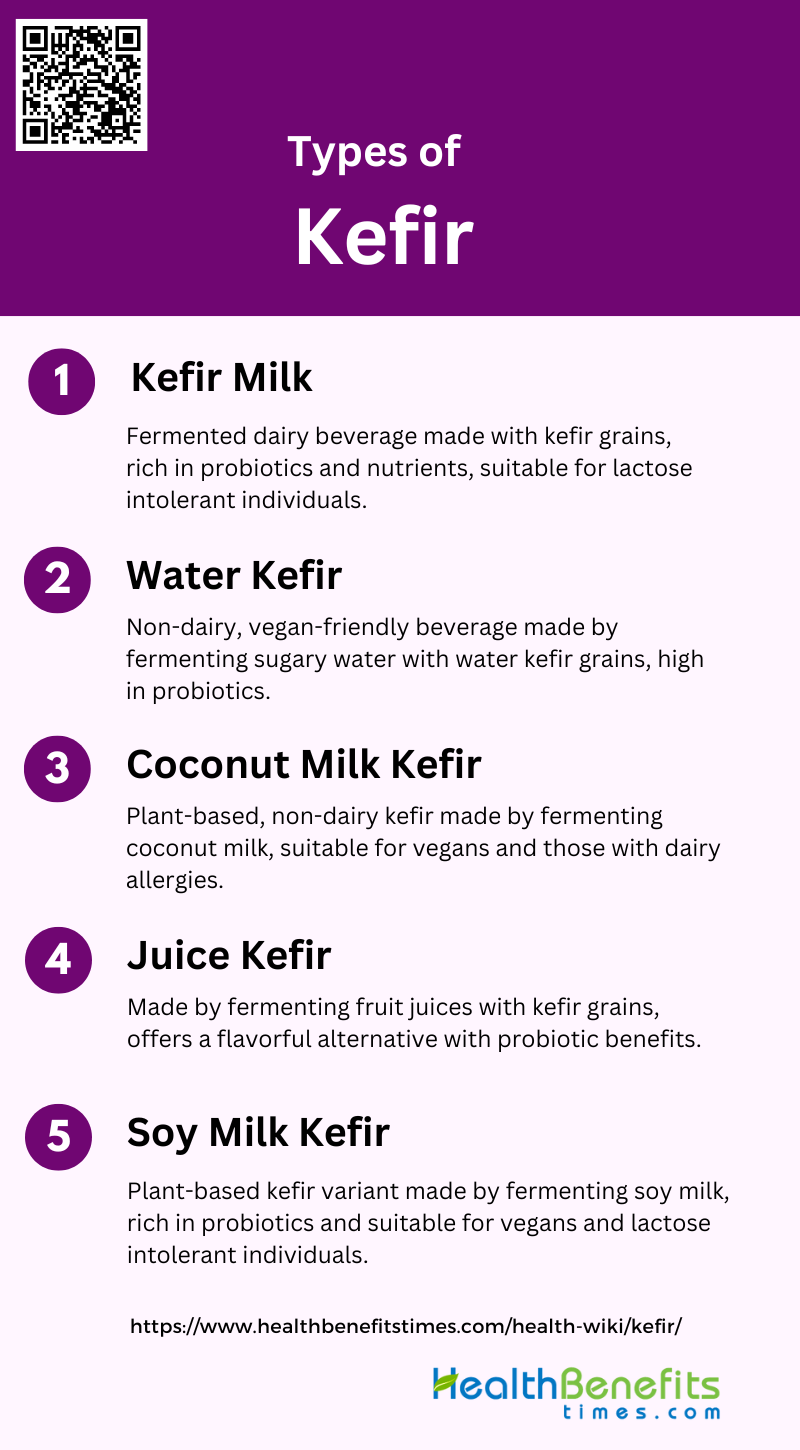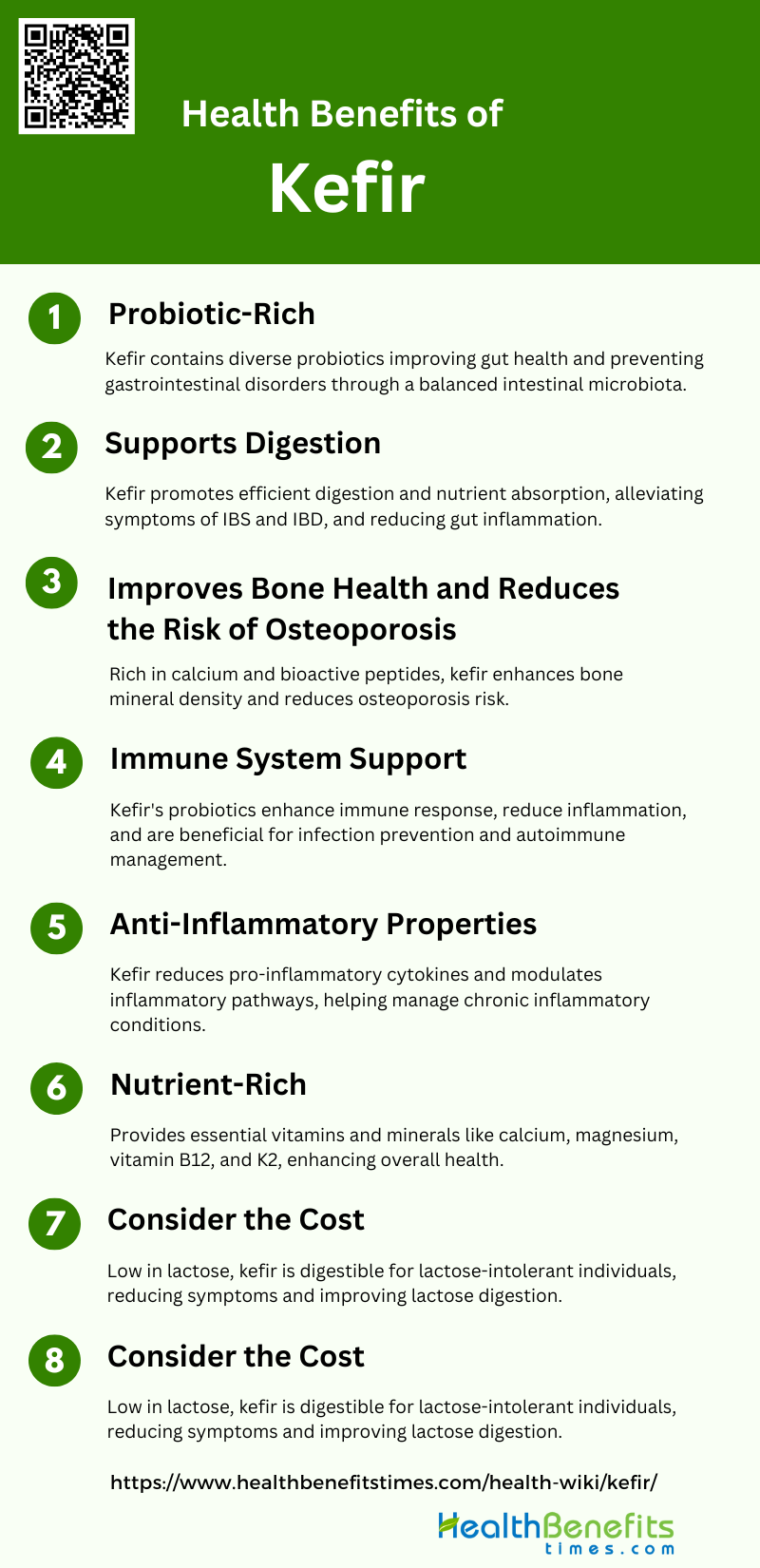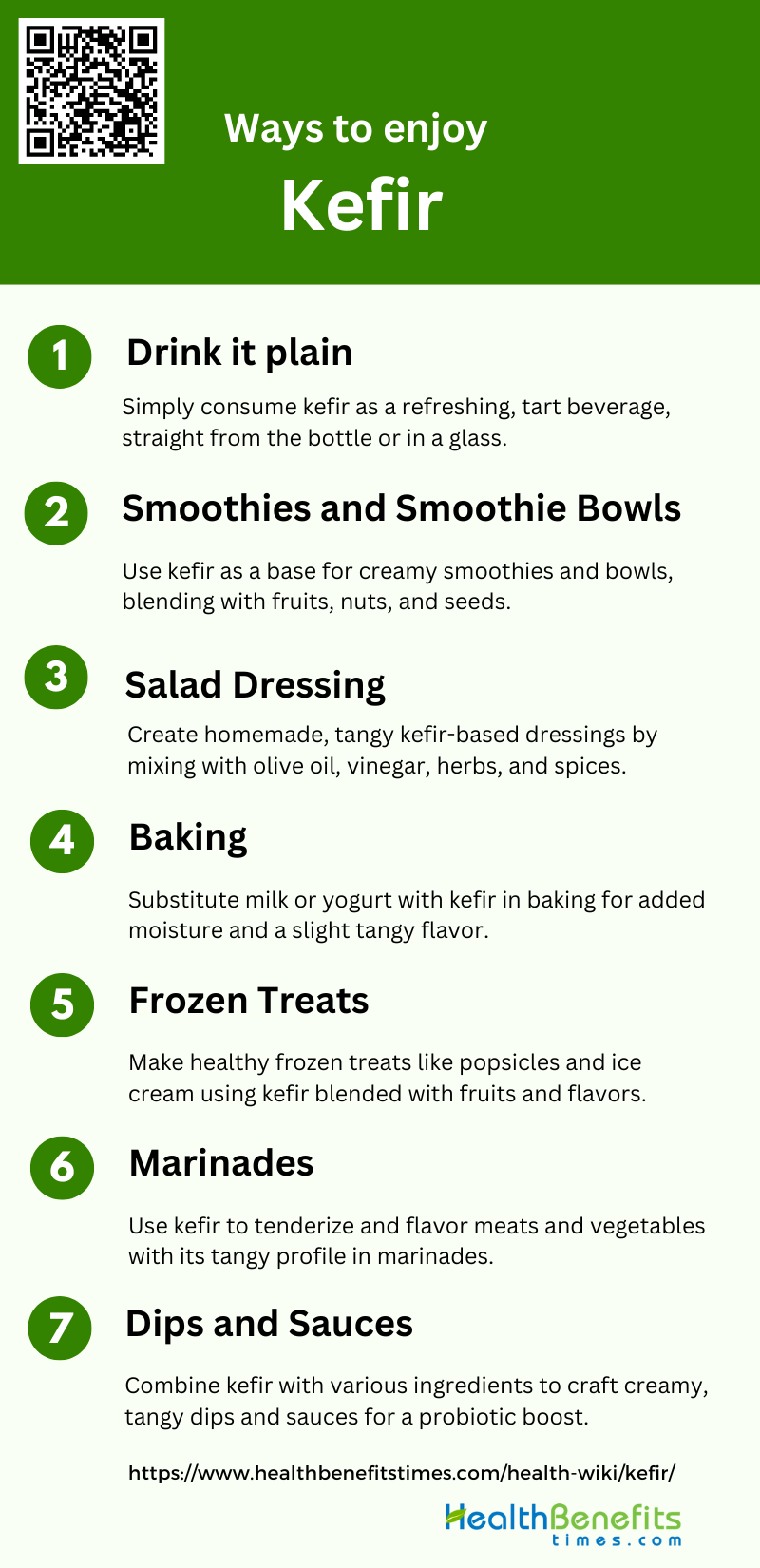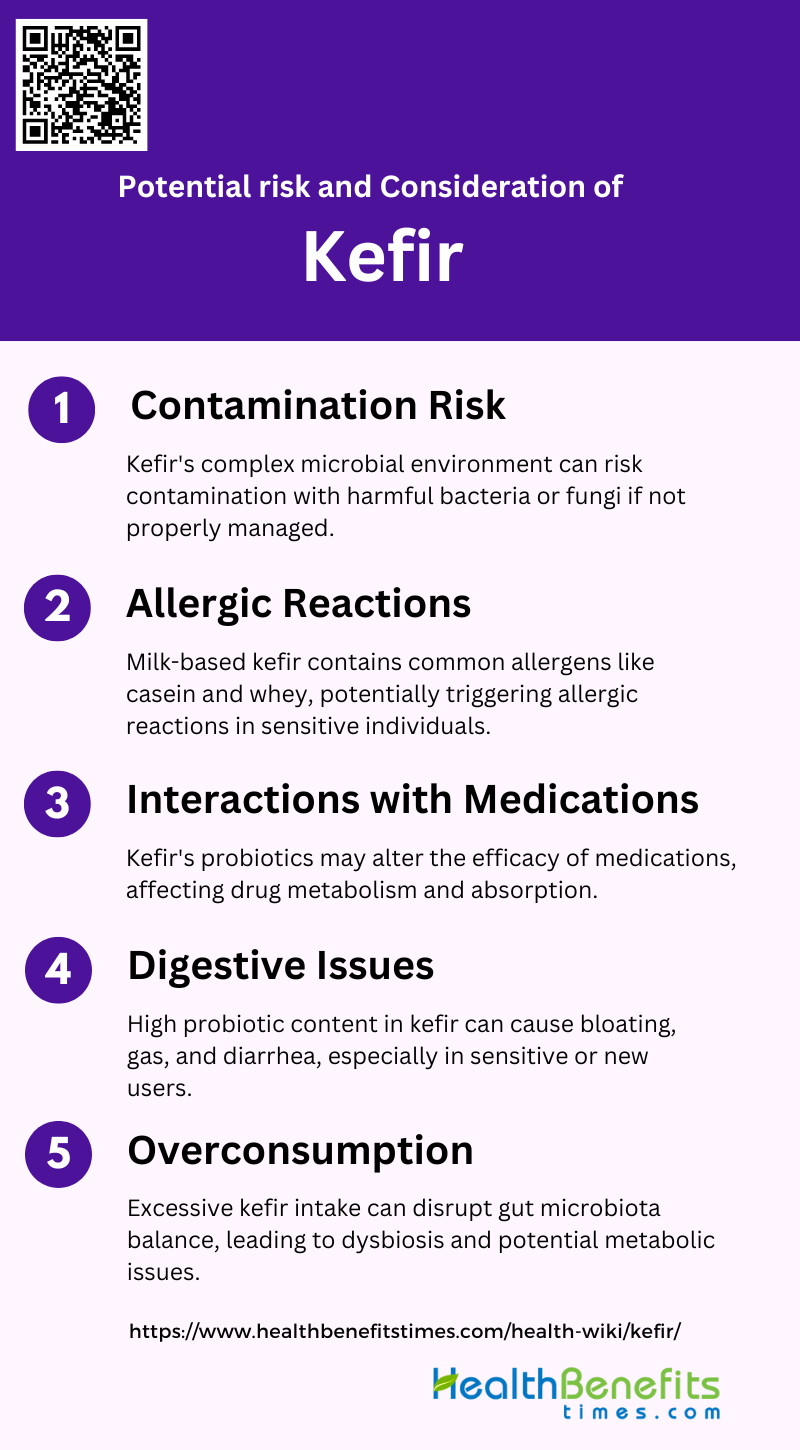Kefir is a fermented milk beverage that originates from the Caucasus Mountains and is produced using kefir grains, which are a symbiotic culture of bacteria and yeasts (SCOBY). These grains resemble small cauliflower florets and contain a mix of lactic acid bacteria, yeasts, and polysaccharides, primarily kefiran. The fermentation process involves these microorganisms metabolizing lactose in the milk, resulting in a tangy, slightly effervescent drink rich in probiotics. Kefir is known for its numerous health benefits, including improving gut health, boosting the immune system, and potentially offering protective effects against various diseases due to its probiotic content.
Origins of kefir
The term “kefir” is derived from the Turkish word “Keif,” meaning “good feeling,” which reflects the health benefits and overall sense of well-being associated with its consumption. Historically, it is believed that shepherds in the Caucasus region discovered kefir when fresh milk carried in leather pouches fermented into an effervescent beverage. The production of kefir involves a symbiotic culture of bacteria and yeast embedded in a matrix of proteins, lipids, and sugars, known as kefir grains. These grains contain a diverse microbiota, including lactic acid bacteria, yeasts, and occasionally acetic acid bacteria, which vary depending on the geographical origin and the type of milk used. The traditional artisanal production methods have spread globally since the late 19th century, integrating kefir into the daily diets of various populations due to its nutritional and therapeutic benefits.
Comparison to yogurt and Kefir
Kefir, produced by a symbiotic culture of bacteria and yeast, generally has a more complex microbial composition compared to yogurt, which is typically fermented by specific strains of bacteria such as Streptococcus thermophilus and Lactobacillus bulgaricus. Studies have shown that kefir can have higher antioxidant potential than yogurt, particularly when made from ewe and camel milk, which possess significantly higher total phenolic content and free radical scavenging activities. Additionally, kefir has been noted for its potential benefits for lactose-intolerant individuals due to its lower lactose content and the presence of lactase-producing bacteria. In terms of amino acid profiles, kefir and yogurt are quite similar, although kefir may contain slightly higher levels of certain amino acids like threonine and alanine. Sensory properties such as flavor and aroma can also differ; kefir often has a more diverse volatile organic compound profile, contributing to its unique taste, which is influenced by the yeast component of its microbial consortium. Despite these differences, both kefir and yogurt offer valuable health benefits and can be enjoyed as part of a balanced diet.
Comparison table of kafir and yogurt
| Features | Kefir | Yogurt |
| Origin | Caucasus Mountains | Ancient Mesopotamia |
| Base Ingredient | Milk (commonly), Water (for water kefir) | Milk |
| Fermentation Agent | Kefir grains (a symbiotic culture of bacteria and yeasts) | Specific strains of bacteria (usually Lactobacillus bulgaricus and Streptococcus thermophilus) |
| Texture | Thinner, more drinkable | Thicker, creamier, usually eaten with a spoon |
| Taste | Tangier and can be slightly effervescent | Milder than kefir |
| Probiotic Content | Typically higher, diverse range of bacteria and yeasts | Generally lower, less diversity |
| Lactose Content | Lower due to fermentation | Higher than kefir but can be lower in some types like Greek yogurt |
| Protein | Generally lower than yogurt | Generally higher, especially in Greek yogurt |
| Fat Content | Depends on the milk used, can be non-fat to full-fat | Depends on the milk used, can be non-fat to full-fat |
| Culinary Uses | Drinkable as is, used in smoothies, can be used in baking | Eaten as is, used as a condiment, in sauces, baking, and cooking |
| Culturing Time | 12-48 hours depending on temperature and desired thickness | Generally 4-8 hours |
| Shelf Life | Can be stored for extended periods due to preservative properties of probiotics | Typically has a shorter shelf life than kefir |
| Health benefits | May improve digestion, boost immunity, and has been linked to various other health benefits | Supports gut health, can be a good source of protein and calcium |
| Nutritional Content | Higher in calcium and vitamin A | Higher in proteins and sometimes fats (especially Greek yogurt) |
| Side Effects | Possible bloating, constipation, or diarrhea if intolerant to dairy | Similar digestive issues if intolerant to dairy |
| Suitability for Lactose Intolerant Individuals | Generally well tolerated due to fermentation reducing lactose content | Varies, some can tolerate it better than others |
Types of kefir
Kefir is a fermented drink traditionally made using cow’s milk or goat’s milk. There are several types of kefir, each with unique characteristics and benefits:
1. Kefir Milk
Kefir milk is a fermented dairy product made by inoculating milk with kefir grains, which contain a symbiotic culture of bacteria and yeasts. This fermentation process results in a beverage rich in probiotics, lactic acid, ethanol, and carbon dioxide, contributing to its unique flavor and health benefits. Kefir milk is known for its antimicrobial, anticancer, and guts health-promoting properties, making it a functional food with significant nutritional value. The fermentation process also enhances the digestibility of milk proteins and lactose, making kefir milk a suitable option for individuals with lactose intolerance.
2. Water Kefir
Water kefir is a non-dairy fermented beverage made by fermenting sugary water with water kefir grains. These grains differ from milk kefir grains in their microbial composition and structure, leading to distinct physical and chemical properties in the final product. Water kefir is an excellent source of probiotics and prebiotics, making it a popular choice among vegans and individuals with dairy allergies. The fermentation process in water kefir results in a beverage with higher ethanol content and lower lactic acid levels compared to milk kefir, offering a different sensory experience.
3. Coconut Milk Kefir
Coconut milk kefir is a plant-based alternative to traditional dairy kefir, made by fermenting coconut milk with kefir grains. This non-dairy option is suitable for vegans, lactose-intolerant individuals, and those with dairy allergies. The fermentation process in coconut milk kefir involves the growth of kefir grains, which thrive in the presence of inulin and other additives, resulting in a beverage with high nutritional and enzymatic content. Coconut milk kefir retains the probiotic benefits of traditional kefir while offering a unique flavor profile and potential health benefits, such as improved gut health and immune function.
4. Juice Kefir
Juice kefir is a fermented beverage made by fermenting fruit juices with kefir grains. This process involves the transition from milk-based fermentation to sugar-based substrates, resulting in a beverage with higher ethanol concentrations and lower lactic acid levels compared to milk kefir. Juice kefir offers a refreshing and flavorful alternative to traditional kefir, with the added benefits of probiotics and bioactive compounds that contribute to gut health and overall well-being. The sensory evaluation of juice kefir indicates its acceptability and potential as a functional beverage.
5. Soy Milk Kefir
Soy milk kefir is another plant-based kefir variant, made by fermenting soy milk with kefir grains. This non-dairy option provides a rich source of probiotics and bioactive compounds, similar to traditional dairy kefir, but is suitable for vegans and individuals with lactose intolerance or dairy allergies. The fermentation process in soy milk kefir enhances its nutritional value, making it a functional food with potential health benefits such as improved gut health, immune modulation, and anticancer properties. Soy milk kefir offers a unique flavor and texture, making it a versatile addition to a healthy diet.
Health Benefits of Kefir
Kefir is a fermented drink known for its numerous health benefits. Here are some of the key advantages:
1. Probiotic-Rich
The symbiotic relationship between these microorganisms enhances the probiotic properties of kefir, making it a potent source of beneficial bacteria. Regular consumption of kefir has been associated with improved gut health, as it helps maintain a balanced intestinal microbiota. This balance is crucial for overall digestive health and can prevent various gastrointestinal disorders.
2. Supports Digestion
The probiotics in kefir help break down food more efficiently and improve nutrient absorption. Additionally, kefir can alleviate symptoms of digestive disorders such as irritable bowel syndrome (IBS) and inflammatory bowel disease (IBD). Studies have demonstrated that kefir-derived extracellular vesicles can reduce inflammation in the gut, thereby improving digestive health.
3. Improves Bone Health and Reduces the Risk of Osteoporosis
Kefir is rich in calcium and bioactive peptides that enhance calcium absorption, which is vital for bone health. Clinical trials have shown that kefir consumption can improve bone mineral density (BMD) and bone metabolism in osteoporotic patients. The bioactive compounds in kefir promote bone remodeling and increase bone formation, thereby reducing the risk of osteoporosis.
4. Immune System Support
The beneficial bacteria in kefir can enhance the body’s immune response by modulating the gut microbiota and reducing inflammation. This immune-boosting effect is particularly beneficial in preventing infections and managing autoimmune diseases. Research indicates that kefir can reduce pro-inflammatory markers and improve overall immune function.
5. Anti-Inflammatory Properties
Kefir exhibits significant anti-inflammatory properties, which can help manage chronic inflammatory conditions. The probiotics and bioactive compounds in kefir can reduce the production of pro-inflammatory cytokines and modulate inflammatory pathways. Studies have shown that kefir consumption can alleviate symptoms of inflammatory bowel disease and other inflammatory conditions by reducing gut inflammation and promoting a healthy microbiota.
6. Nutrient-Rich
It is an excellent source of calcium, magnesium, vitamin B12, and vitamin K2, all of which are important for maintaining overall health. The fermentation process also enhances the bioavailability of these nutrients, making them easier for the body to absorb and utilize. Regular consumption of kefir can contribute to meeting daily nutritional requirements.
7. Lactose Intolerance
The fermentation process breaks down lactose into simpler sugars, making it easier to digest. Additionally, the probiotics in kefir can help improve lactose digestion and reduce symptoms of lactose intolerance. This makes kefir a suitable dairy option for those who are lactose intolerant.
8. Antibacterial Properties
The lactic acid bacteria and yeasts in kefir produce antimicrobial compounds that inhibit the growth of harmful bacteria. Studies have shown that kefir can effectively combat foodborne pathogens and improve gut health by maintaining a balanced microbiota. The addition of specific probiotic strains, such as Lactobacillus fermentum, can further enhance the antibacterial activity of kefir.
How to Make Kefir?
Follow these steps to create your own delicious and nutritious kefir:
1. Prepare the Jar: Clean your glass jar thoroughly to ensure it’s free from any contaminants.
2. Add Kefir Grains: Place about 1-2 tablespoons of kefir grains into the jar.
3. Add Milk: Pour about 2 cups of milk into the jar. The ratio of milk to kefir grains can be adjusted based on your preference for kefir thickness and fermentation time.
4. Cover the Jar: Cover the jar with a breathable cover and secure it with a rubber band. This allows gases to escape while keeping contaminants out.
5. Ferment: Leave the jar at room temperature (around 68-72°F or 20-22°C) for 24-48 hours. The fermentation time depends on the temperature and your taste preference. The longer it ferments, the tangier and thicker it will become.
6. Strain the Kefir: After fermentation, stir the mixture gently and pour it through a plastic or nylon strainer into another clean jar or bowl. Use a plastic or wooden spoon to help the liquid pass through if needed. The kefir grains will remain in the strainer.
7. Store the Kefir: Transfer the strained kefir to a clean jar and cover it with a lid. Store it in the refrigerator. It can be consumed immediately or kept for up to a week.
8. Reuse the Grains: Place the kefir grains back into the original jar and add fresh milk to start the process again. Kefir grains can be reused indefinitely if properly cared for.
Ways to Enjoy Kefir
Whether you’re looking to incorporate it into your meals or enjoy it as a refreshing beverage, there are numerous delicious options to explore. Here are some creative and tasty ways to enjoy kefir:
1. Drink it plain
One of the simplest ways to enjoy kefir is to drink it plain. Kefir has a slightly tart and refreshing taste, similar to a drinkable yogurt. You can drink it straight from the bottle or pour it into a glass. Plain kefir is a great source of probiotics and protein, making it a nutritious addition to your daily routine.
2. Smoothies and Smoothie Bowls
Kefir is an excellent base for smoothies and smoothie bowls. Simply blend it with your favorite fruits, vegetables, nut butters, and other ingredients for a thick, creamy, and nutrient-dense beverage or meal. The tangy flavor of kefir complements sweet fruits like bananas, berries, and mangoes beautifully. Top your smoothie bowl with granola, nuts, seeds, and fresh fruit for added texture and flavor.
3. Salad Dressing
The tangy taste of kefir makes it a fantastic ingredient for homemade salad dressings. Whisk together kefir, olive oil, vinegar, herbs, and spices for a creamy and flavorful dressing that can elevate any salad. Kefir dressings are a healthier alternative to store-bought options and can add a probiotic boost to your greens.
4. Baking
Kefir can be used as a substitute for milk, buttermilk, or yogurt in various baking recipes. Its slightly acidic nature helps to tenderize baked goods like cakes, muffins, and bread. Kefir also adds a subtle tangy flavor and moisture to baked treats. Experiment with using kefir in your favorite recipes for a unique twist.
5. Frozen Treats
Kefir can be used to make delicious frozen treats like popsicles, ice cream, and frozen yogurt. Simply blend kefir with your desired flavors, such as fruits, honey, or vanilla, and freeze the mixture. The probiotic content of kefir makes these frozen treats a healthier indulgence.
6. Marinades
The tangy flavor of kefir makes it an excellent base for marinades. Combine kefir with herbs, spices, and other ingredients to create flavorful marinades for meats, vegetables, or tofu. The lactic acid in kefir helps to tenderize proteins and infuse them with flavor.
7. Dips and Sauces
Kefir can be used to create creamy and tangy dips and sauces. Mix it with herbs, spices, and other ingredients to make dips for vegetables, chips, or crackers. Kefir can also be used as a base for sauces to accompany meats, pasta, or rice dishes, adding a probiotic boost and a unique flavor profile.
Potential Risks and Considerations
While kefir offers numerous health benefits, it’s important to be aware of potential risks and considerations associated with its consumption. These factors can help you make informed decisions and avoid any adverse effects. Here are some key risks and considerations to keep in mind:
1. Contamination Risk
This complex microbial environment can pose a risk of contamination if not properly managed. Contaminants can include pathogenic bacteria or fungi that may proliferate during the fermentation process. Studies have shown that the microbial composition of kefir can vary significantly, which underscores the importance of stringent quality control measures to prevent contamination. Ensuring proper hygiene and using high-quality starter cultures can mitigate these risks, but the potential for contamination remains a significant consideration.
2. Allergic Reactions
For instance, milk-based kefir contains casein and whey proteins, which are common allergens. Additionally, the fermentation process can produce histamines and other biogenic amines that may exacerbate allergic responses. Research indicates that while kefir has anti-allergenic properties, it can also cause adverse reactions in some people, particularly those with pre-existing food allergies. Therefore, individuals with known allergies should exercise caution and consult healthcare providers before consuming kefir.
3. Interactions with Medications
Kefir’s probiotic content can interact with certain medications, potentially altering their efficacy. For example, the probiotics in kefir can affect the gut microbiota, which plays a role in drug metabolism. This interaction can either enhance or inhibit the absorption and effectiveness of medications, such as antibiotics and immunosuppressants. Studies have highlighted the need for further research to understand these interactions fully, but preliminary findings suggest that kefir consumption should be carefully monitored in individuals on medication. Consulting with healthcare professionals is advisable to avoid potential adverse effects.
4. Digestive Issues
While kefir is generally beneficial for gut health, it can cause digestive issues in some individuals. The high probiotic content can lead to symptoms such as bloating, gas, and diarrhea, especially when consumed in large quantities or by those with sensitive digestive systems. Research has shown that kefir can modulate gut microbiota, which may lead to temporary digestive discomfort as the body adjusts. Gradual introduction and moderation in consumption can help mitigate these digestive issues, but they remain a consideration for new users.
5. Overconsumption
Overconsumption of kefir can lead to an imbalance in gut microbiota and other health issues. While kefir is rich in beneficial probiotics, excessive intake can overwhelm the gut’s natural flora, potentially leading to dysbiosis. Additionally, kefir contains calories and sugars that can contribute to weight gain and metabolic issues if consumed in large amounts. Studies emphasize the importance of moderation, noting that while kefir has numerous health benefits, overconsumption can negate these advantages and lead to adverse health outcomes. Therefore, it is crucial to consume kefir in recommended amounts to avoid potential risks.


